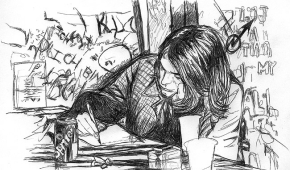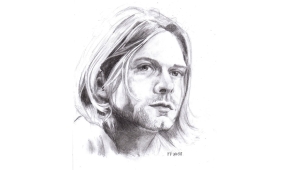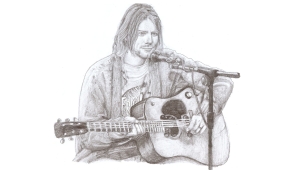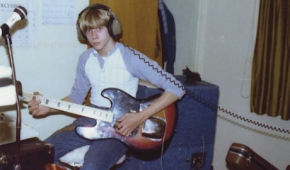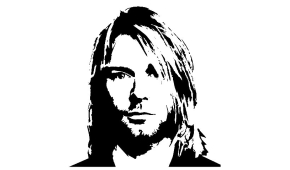Kurt Cobain: Lost Interview
I never really knew about my ancestors until this year, when I learned that the name Cobain was Irish. My parents had never bothered to find that stuff out.
The interview you are about to read transpired late on the evening of
Thursday, July 22, 1993, arranged as part of Nirvana's U.K. press campaign for
the then soon-to-be released In Utero (DGC). In contrast to their almost total
silence in the American media, Nirvana had five U.K. interviews and photo shoots
slotted into their brief stay in New York, culminating with a showcase concert
at Roseland on the evening of the 23rd. This would have been an unusually
grueling schedule for even the most unflappable of groups. But then, hardly
anything associated with Nirvana was usual.
The affable, straight-ahead presence of Chris (now Krist) Novoselic and Dave
Grohl notwithstanding, the atmosphere surrounding Nirvana at the time was
strongly reminiscent of the feeling that accompanied the Sex Pistols in 1977.
Here, too, was a group-the hottest group of the moment-who were about more than
just music, and who were refusing to play the game. Judging from the hysteria
that greeted their return after a year of silence, Nirvana acted as a kind of
psychic lightning rod: a focus for everyone's fears, hopes, loves and hates. Few
knew where they were coming from, nobody knew what they would do.
Much of this pressure rested on Kurt Cobain, who just to keep things interesting
was at once charming, arrogant, vague and unpredictable. Getting him to sit down
for the interview was hard. I managed to pin him down backstage after an
extraordinary Melvin's show we both attended. "Do I have to do this now?" he
asked me. "Yes," I replied simply and that was that. We subsequently adjourned
to my room at the New York Palace hotel, where once he relaxed, Cobain was
intelligent, cogent and as candid as he could be, given his situation.
GUITAR WORLD: Tell me about your background.
KURT COBAIN: I was born in Aberdeen, Washington, in 1967, and I lived between
Aberdeen and Montesano, which was 20 miles away. I moved back and forth between
relatives' houses throughout my whole childhood.
GW: Did your parents split up
when you were young?
COBAIN: Yeah, when I was seven.
GW: Do you remember anything about that?
COBAIN: I remember feeling ashamed, for
some reason. I was ashamed of my parents. I couldn't face some of my friends at
school anymore, because I desperately wanted to have the classic, you know,
typical family. Mother, father. I wanted that security, so I resented my parents
for quite a few years because of that.
GW: Have you made up with them now?
COBAIN: Well, I've always kept a relationship with my mom, because she's always
been the more affectionate one. But I hadn't talked to my father for about 10
years until last year, when he sought me out backstage at a show we played in
Seattle. I was happy to see him because I always wanted him to know that I
didn't hate him anymore. On the other hand, I didn't want to encourage our
relationship because I just didn't have anything to say to him. My father is
incapable of showing much affection, or even of carrying on a conversation. I
didn't want to have a relationship with him just because he's my blood relative.
It would bore me.
So the last time that I saw him, I expressed that to him and made it really
clear that I just didn't want anything to do with him anymore. But it was a
relief on both our parts, you know? Because for some years he felt that I really
hated his guts.
GW: You can't duck it.
COBAIN: That's what I've done all my life, though. I've always quit jobs without
telling the employer that I was quitting; I just wouldn't show up one day. I was
the same in high school-I quit with only two months to go. I've always copped
out of things, so to face up to my father although he chose to seek me out-was a
nice relief.
GW: Have you written about this stuff at all? The lyrics on "Serve the Servants"
sound autobiographical.
COBAIN: Yeah. It's the first time I've ever really dealt with parental issues.
I've hardly ever written anything that obviously personal.
GW: What was it like for you growing up?
COBAIN: I was very isolated. I had a really good childhood, until the divorce.
Then, all of a sudden, my whole world changed. I became antisocial. I started to
understand the reality of my surroundings, which didn't have a lot to offer.
Aberdeen was such a small town, and I couldn't find any friends that I was very
fond of, or who were compatible with me, or liked to do the things that I liked.
I liked to do artistic things and listen to music.
GW: What did you listen to then?
COBAIN: Whatever I could get a hold of. My aunts would give me Beatles records,
so for the most part it was just the Beatles, and every once in a while, if I
was lucky, I was able to buy a single.
GW: Did you like the Beatles?
COBAIN: Oh, yeah. My mother always tried to keep a little bit of British culture
in our family. We'd drink tea all the time! I never really knew about my
ancestors until this year, when I learned that the name Cobain was Irish. My
parents had never bothered to find that stuff out. I found out by looking
through phone books throughout America for names that were similar to mine. I
couldn't find any Cobains at all, so I started calling Coburns. I found this one
lady in San Francisco who had been researching our family history for years.
Page 1 | Page 2
